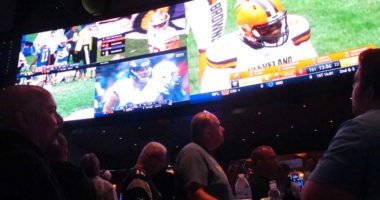NY Sports Betting Bids: Breaking Down What We Know From The Redacted Proposals

The New York State Gaming Commission released the details of proposed bids to operate NY sports betting, shedding some light on how the market might work.
Details from the six bids show the different proposals on the table, over hundreds of pages of documents. Here’s a quick summary of each bid, many of which were heavily redacted:
Super bid 1: FanDuel, DraftKings, BetMGM and Bally, Seneca
This bid combining four major operators and one Native American tribe proposes and estimates:
- Four sportsbook operators.
- A revenue share or tax rate of 50%.
- $1.3 billion in gross revenue by year 3.
- Those two numbers would project out to more than $600 million in revenue to the state.
- $100 million in license fees.
The group believes its strength lies in its current domination of the US market, which approaches 80%. It also suggests adding more operators beyond this bid would create “economically unfeasible conditions.”
From the bid:
Each of these companies individually offers customers myriad options to bet on a wide variety of events that, combined, will create limitless choices for the consumer. And because of their place at the top of the market and their deep experience in the field, each of the four companies boasts staffs stacked with industry leaders in betting, technology, customer service, and financial oversight. With all four platforms available to New Yorkers, the state will enjoy a market unparalleled anywhere in the world, with a sustainable source of revenue generated by the most reliable names in the business.
Each operator would be on its own platform and not on a single platform, as some feared would happen out of the law and ensuing regulations.
Super bid 2: Kambi, Caesars, PointsBet, Resorts World, Rush Street, WynnBet, Oneida, St. Regis Mohawk
This large bid includes a number of operators that trail the top three in the bid above, as well as a third party that will help with the tech stack (Kambi) and two tribes in the state.
Estimates and proposals for the bid:
- Up to nine sportsbook operators
- 51% tax
- $100 million in up-front licensing fees
- $892.5 million projected annual tax revenue
This group believes their land-based presence in New York and their national network of commercial partnerships will set them apart from the field. The consortium does not enjoy the same level of success as the first group, combining to account for 19% of the total US revenue over the past 12 months. Their proposal also includes a commitment for a combined marketing spend of more than $600 million per year to sweeten the pot.
The group also says that it is not opposed to other groups being accepted: From their bid packet:
If our consortium is the only one selected by the Commission, we are best positioned to maximize the overall benefit for the State with the lowest risk. If the Commission desires to have a more robust market, our application provides the flexibility for the Commission to add other consortia. We recognize, based on analysis of other states, that more operators tend to create more revenue.
And here’s more on the relationship with the Native American gaming tribes:
Both Oneida and Mohawk have agreed to waive certain rights if our consortium is selected. The Oneida Indian Nation’s rights include a 10–county Exclusivity Zone and a Most Favored Nation arrangement that would enable the Oneida to launch mobile sports betting upon adoption by the State. If the Oneida were to launch mobile sports wagering in New York, CBRE estimates it would reduce State tax revenue from mobile sports wagering by up to $135 million annually.
Super bid 3: Kambi, Fanatics, Penn National Gaming/Barstool Sportsbook
Another bid with multiple operators includes apparel company Fanatics — which is quickly getting into the gambling space — and Barstool Sportsbook owner Penn National.
Some key points from this bid:
- An estimate of nearly one billion dollars of incremental tax revenue for the state over the next decade.
- Penn and Fanatics partnered with Saint Regis Mohawk Tribe, including a five percent revenue share and minimum guaranteed payout of $2.5 million regardless of how well the sportsbooks perform in the market.
The proposal focused on Penn National and its 42 gaming and racing properties in 20 jurisdictions. Penn also has a 36 percent equity in Barstool, which is valuable due to its massive media platform (100 million unique visitors monthly), brand recognition, key reach in the 21-35 age demographic and NYC headquarters.
Fanatics, meanwhile, has a partnership with Roc Nation (founded by Jay-Z) and BSE Global (Brooklyn Nets). It also already has a massive base of consumers from retail sales, and continues to expand, including the addition of a sportsbook.
Other bids with fewer details
We know a bit less about some of the other bids, which are more heavily redacted:
Bet365
A huge operator internationally with a relatively small presence in the US, Bet365 is one of the three “standalone” bids in the state.
Estimates and proposals are largely redacted here, but Bet365 would be the only operator under this bid.
FOX Bet
FOX Bet highlighted its television presence and host of personalities in its bid as well as its partnership with the New York Post. However, most of the financial particulars are redacted. Accordingly, we only know that, if chosen, FOX Bet will serve as platform provider and operator and ostensibly keep encouraging people to win Terry Bradshaw’s money.
The sportsbook operator is also owned by Flutter, which is the same parent company that owns FanDuel.
TheScore
For its proposal, theScore focused on its unique customer funnel, leveraging its monthly audience of more than 170 million theScore fans. While theScore has not seen much success from the sports betting app’s integration into the larger theScore app, the company still seems to believe its strongest asset is its large audience of casual sports fans.
However, the proposal did also highlight that it owns and operates its own tech stack, which is one of the more advanced apps in the market. Revenue estimates and a proposed tax rate for this bid are redacted.
It’s also not clear if this bid will be impacted by Penn National Gaming acquiring the Score, a transaction that was recently announced.
Dustin Gouker, Eric Ramsey and Jessica Welman contributed to this story.







